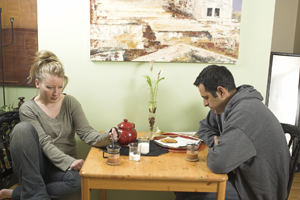Five ways to argue constructively with your partner
by Dr. Larry F. Waldman —
The divorce rate hovers at around 50 percent, which I contend is a national tragedy. A major reason for this statistic is that most couples have not learned how to settle their issues. The following are ways to argue constructively with your partner:
1. “Discussions,” a.k.a. arguments, are necessary in any relationship to allow it to grow, but the process must be constructive. Destructive arguing consists of raised voices and using demeaning and discounting words, which leads to resentment and ongoing issues that never end. With constructive arguing, the goal is a resolution or compromise — not a winner or a loser.
2. Most marital spats are spontaneous — where one party is upset and the other party is caught off guard. Resolution is rarely achieved in these “ambush” arguments. Couples should make an appointment to discuss an issue.
3. During a scheduled discussion, one — and only one — issue should be dealt with at a time. When most couples argue, within seconds every other issue the couple has gets dumped into the conversation. Resolution then becomes impossible. No “sidetracking” (getting off the issue), no “bombs” (making inflammatory comments) and no “digging up the museum” (bringing up an old, sore issue). Each partner must strive to speak only about the circumscribed issue until it is resolved.
4. It is easier to settle issues when couples learn to speak concretely. The questions that need to be considered are: What does it look like? What would I see? For example, if a wife tells her husband she would like him to be “more affectionate,” he should not respond, “You do not know what you are talking about; I am as affectionate as the next guy.” Instead he should ask, “Dear, if I were more affectionate, what would it look like? What would we see?”
His wife could then answer with whatever behavior she would view as affectionate — hold her hand, write her a love note, bring her flowers, bathe the baby, rub her back, fix the sink, arrange a date (including securing the babysitter), etc.
5. For most couples, arguing entails over-shouting, interrupting and negative body language. If one party is silent, he or she is typically not listening to the other partner but instead is focused on a response as soon as he or she can get a word in edgewise.
Try using the paraphrase technique, which involves having one partner state his or her position for no more than 60 seconds while the other partner quietly listens. At the end of the minute, before the second partner can offer a rebuttal, the first partner must paraphrase the other’s position. This forces the partner to really “hear.” Once the partner states the other’s view, that partner gets his or her 60 seconds and then the other partner must listen and paraphrase.
Couples who adopt these five rules will quickly learn that their discussions can be constructive, issues can be resolved and their relationship can flourish.
Larry F. Waldman, Ph.D., ABPP, is a licensed psychologist who has practiced in the Paradise Valley area of Phoenix for more than 35 years. He is an author and teaches graduate courses for the Educational Psychology Department at Northern Arizona University. larrywaldmanphd@cox.net, 602-996-8619 or topphoenixpsychologist.com.
Reprinted from AzNetNews, Volume 34, Number 2, April/May 2015.






April 7, 2015
April/May 2015 Issue, Communication, Featured, Love and Relationships